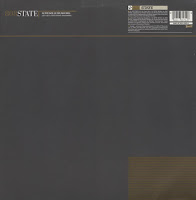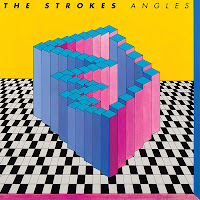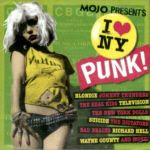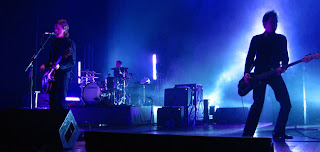Watching the second programme made me incredibly nostalgic for a year that my music tastes started to develop properly. Just being reminded of 808 State's 'In Yer Face', which I bought (and still have, somewhere) on cassette single made the hairs stand up on my arms. Likewise '3AM Eternal' by The KLF (I have a German 12", bought several years later, and a 7” picked up in Luxembourg last week). Likewise 'Move Any Mountain' by The Shamen, which I had on the album En-Tact (the programme has hastened my need to have KLF's The White Room and En-Tact on CD rather than the over-played tapes sitting in my loft). Incidentally, 'Move Any Mountain' is a classic track, though much maligned because of Mr C's dodgy rap. What's often overlooked is that Mr C was a fantastic techno DJ. He couldn't rap for toffee (see 'Ebeneezer Goode'), but as a DJ he was pretty unequalled. I saw him play once; he gave me a flyer after his set. Anyone who has heard the dodgy hippy stuff The Shamen knocked out before Mr C arrived will also appreciate just how much he improved this otherwise unimpressive band.

What I found, to my surprise, was that I remembered most of the songs that were played, and indeed have most of them now, but hardly any were purchases at the time. I'm not revisionistic enough to try and claim that I had bought every single track at the time: 'Feel Every Beat' by Electronic (the album was borrowed from my friend Steve and my own copy purchased years later); 'X, Y And Zee' by Pop Will Eay Itself (borrowed from my friend Jon and a 7" copy bought years after); 'Human Nature' by Gary Clail (never even heard this at the time and yet bought a 7" of it from a charity shop some five years later); 'Sit Down' by James (I hated this when it came out but have since become enamoured of its oft-overlook lyrical depth, and now own most of the James back catalogue); 'I Wanna Be Adored' by The Stone Roses (ditto 'Sit Down'; hated this band at the time and mostly still do, but I think this track has an understated self-deprecating quality); 'Smells Like Teen Spirit' by Nirvana (I resisted Nirvana actively for years until I met Mrs S; I concede that even when Kurt fucked up his voice deliberately to sabotage the TOTP performance, he still sounded amazing); 'Loose Fit' by Happy Mondays (thanks go to Neil for getting me into the Mondays at University; I hated the entire 'baggy' scene at the time).
Partly this paucity of purchases was logical - I was still living off pocket money and a 2p-per-paper free newspaper round at the time, so disposable income for record purchases was slim. The only other record I actually bought of those played was 'Dizzy' by Vic Reeves and The Wonderstuff. This was again bought on cassette single, but even by the time I left Music Junction in Stratford-upon-Avon I regretted it. So I gave it to my friend Rob that afternoon; his brother, Chris, who would later influence my love for all things electronica, took offence at Rob having this single in the house and threw it out of a first floor window, whereupon it shattered.
So, happy 20th birthday to Primal Scream's Screamadelica. As with most of the music above, I didn't buy this when it came out. I bought it three years later, by which time I was absorbed in all things dance music and kept reading about how important Screamadelica was, how influential blah blah blah. Up to then I'd considered them a bit too 'rock' and more than a bit druggy. The programme confirmed both those old prejudices, although on the latter front Andrew Innes seems to have weathered pretty well, unlike Robert 'Throb' Young and Bobby Gillespie.

I bought Screamadelica on a date with a girl from school called Claire. I think she was a little bemused when I took her into Our Price in Stratford and started raving about how important this album was, how I was amazed she'd never heard of it etc. Christ, I must have sounded like such a geeky trainspotter, especially as I hadn't heard it myself until later that afternoon. I also bought a shirt from Principles while I was with her. It is no surprise to me that there was no second date.
When I first heard Screamadelica, it was filtered through all the pure dance music that came after, all of which felt more authentic; consequently I felt a little cold toward the hybrid nature of the songs and the whole thing felt a little scattergun. This was explained during the programme - initially, Screamadelica wasn't intended as an album, but a series of singles, mostly produced by Andy 'Sabres Of Paradise' Weatherall and Hugo Nicholson. Finally, Alan McGee, boss of Creation Records, suggested that they couldn't keep churning out hastily-recorded singles and remixes, and that an album proper was required. Accordingly it hangs together with little coherence, despite Weatherall's attempt to sequence it into a uniform trip, from the euphoric 'Moving On Up' to the comedown epic 'Shine Like Stars'.
Don't even get me started on 'Moving On Up' and 'Damaged', two good but straight rock tracks linking the band back to their previous eponymous album and Screamadelica's Stones-esque follow-up Give Out But Don't Give Up. These two tracks sadly reinforce the view that Primal Scream were a rock band first and foremost who happened to dabble fortuitously in dance music to further their otherwise slight reputation; without the guiding hands of Weatherall and Nicholson, the Scream were just a rock-by-numbers band with little going for them.
Don't get me wrong, 'Don't Fight It, Feel It' and the cover of 13th Floor Elevators' 'Slip Inside This House' are superb. The Orb's production of 'Higher Than The Sun' is one of the best (and druggiest) things The Orb ever recorded; the gnomic Alex Patterson from The Orb was one of the talking heads on the programme and spoke glowingly of the track, believing it a worthy successor to their own 'Little Fluffy Clouds'.
Overall, the documentary left me thinking that the trio of Gillespie / Innes / Young don't recall much of the making of Screamadelica, thanks to the E and also because - call me cynical - they don't seem to have been that involved. Screamadelica is, to me, Weatherall's baby and it sounds far better when listened to as a remix album. Bassist Henry Olsen (formerly of Nico's backing band The Faction), later usurped by The Stone Roses's Mani, came across as a thoroughly decent individual, as did 'Don't Fight It, Feel It' vocalist Denise Johnson, mainly because they actually remember what happened; that said, listen to Olsen smugly eulogise his performance of the main riff on 'Damaged' and it again reinforces the notion of a rock band that lucked out with a hip dance producer. (Olsen, incidentally, is the son of my first primary school teacher.)
Perhaps that's one sacred cow too many?






